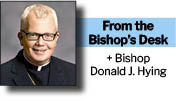
An intriguing paragraph in the Catechism of the Catholic Church, which I have often pondered, is #675: “The Church’s ultimate trial. Before Christ’s second coming, the Church must pass through a final trial that will shake the faith of many believers. The persecution which accompanies her pilgrimage on earth will unveil ‘the mystery of iniquity’ in the form of a religious deception offering men an apparent solution to their problems at the price of apostasy from the truth. The supreme religious deception is that of the Antichrist, a pseudo-messianism by which man glorifies himself in place of God and of his Messiah come in the flesh.”
Very few people sin because they want to make themselves miserable and endanger the salvation of their soul.
Evil usually comes to us, disguised as an angel of light, promising us happiness and fulfillment if we simply surrender to our temptations towards the seven deadly sins, whether it be pride, avarice, anger, lust, sloth, envy, or gluttony.
Once we have fallen for the treachery of sin, it rips off its deceptive mask and reveals both its moral ugliness and its radical inability to ever fulfill its false promises of joy.
Because of humanity’s fundamental enslavement to sin and its tragic consequence of death, Jesus Christ came to rescue us and restore our original identity as children of the Father, freed and forgiven, through the power of His death and resurrection.
Forgiveness and redemption
As the essential “sacrament” of Christ’s presence and mission in the world until the end of time, the Catholic Church both teaches the divine revelation given to us through the Scriptures and the Tradition and offers the merciful reconciliation won for us in Christ, so that we can be freed from the grasp of sin and death.
In other words, the Church both convicts us of our sin, getting us in touch with our profound need of Christ and His salvation, and then offers the only solution to our lost and broken state: Forgiveness and redemption in the Lord through faith and the grace of the Sacraments.
A bad fruit of the enduring rebellion against God and His truth, brewing in the West for a very long time but now reaching fever pitch in the wake of the sexual revolution, is the fundamental denial of moral absolutes and natural law.
Many influential voices in our society question the given reality of human nature, the sacredness of life in the womb, the meaning and purpose of sexuality, the definition of marriage, and even the identity of man and woman.
We have arrived at a point of such intellectual and moral confusion that myriads of intelligent and educated people deny the basic facts of our biology and humanity, but, as G.K. Chesterton reminds us, asserting that the sky is green does not make it so.
Reaffirming the truth
This desire to redefine moral reality has now found a voice within the Church Herself, as some individuals, certainly theologians, but even some bishops and priests, advocate for fundamental shifts in Catholic teaching regarding the acceptance of contraception, homosexual activity, transgenderism, even including puberty blockers and surgery for minors, and euthanasia.
While I am not suggesting that we are in the “final trial” or that the end of the world is near (although that always remains a possibility), could this current dynamic of seeking to redefine Church teaching be part of what the Catechism refers to in paragraph #675: The deceiving temptation to solve man’s problems by denying the Truth which the Church has always taught, and to redefine sin, in order to simply affirm people in their moral choices?
In this confusing time when everything seems up for critique, redefinition, and question, it is vitally important to reaffirm the eternal and unchanging realities of Truth.
God, the Scriptures, the beautiful teachings of our Faith, the inestimable gift of human nature, and the identity and mission of the Church do not change.
We can change, hopefully for the good, as we grow in our understanding of these timeless gifts revealed to us by God, but we do not have the power to redefine or adapt what the Lord has given us just to conform to the cultural fashions of the moment.
There is no faster or easier way to render the Church impotent and irrelevant than to follow the cultural zeitgeist.
Rather, we must stand courageously and lovingly in the radiant light of the Lord, teaching the Truth given to us as the lasting guarantor of human freedom and dignity and compassionately accompanying those who struggle and even fail to accept and live aspects of that Truth.
We are all sinners. Despite assertions to the contrary, one can and should be faithful and pastoral at the same time.
We can profoundly harm a brother or sister by not offering them the fullness of Church teaching, just as we can harm them by not loving and walking with them in their hurt, pain, and struggle.
This fusion of truth and charity is the hallmark of Jesus’ identity and mission, and so it must be for us.

